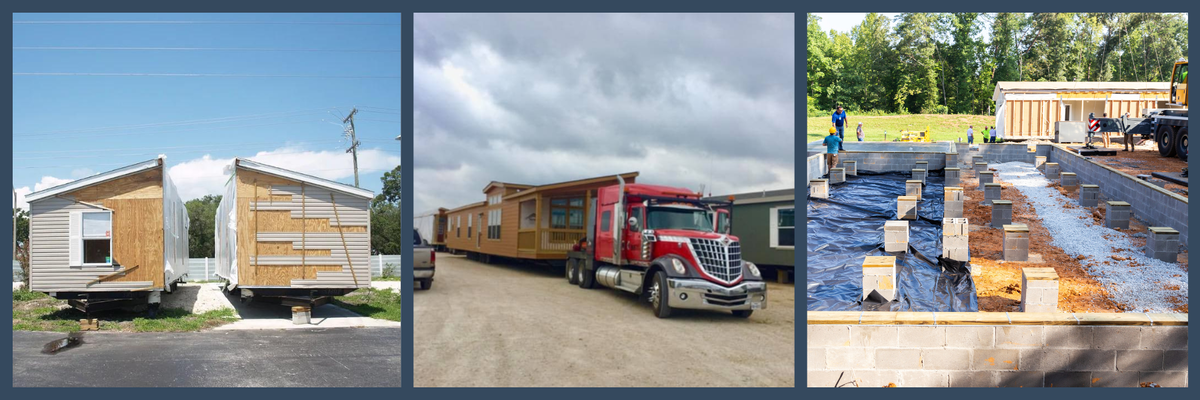
At Alternative Home Pros, we are dedicated to connecting manufactured home owners with professionals who provide the specialized services needed for transporting, tearing down, and setting up manufactured homes. Whether you’re purchasing a new home or relocating your existing one, these processes can be complex and require proper planning and budgeting. In this blog, we will break down the different types of moves, associated costs, and what you should consider to ensure a smooth and cost-effective relocation.
Types of Manufactured Home Moves:
When it comes to moving a manufactured home, you have two main options: Transport-Only Moves and Full-Service Moves. Choosing the right option depends on your budget, the condition of your home, and the amount of work you're willing to handle yourself.

1. Transport - Only Moves
A Transport-Only Move involves moving your home from one location to another without additional services. This type of move is ideal for homeowners who are comfortable with handling tasks like disconnecting utilities, removing skirting, or detaching structures like decks on their own. The moving company will only be responsible for towing your home to the new location and ensuring it’s placed securely on the new lot.
Cost Estimate (up to 60 miles): $1,000 - $3,500
Pros: Lower cost, suitable for smaller homes or shorter distances
Cons: Homeowner is responsible for teardown and reassembly tasks

2. Full-Service Moves
A Full-Service Move includes everything: tearing down your home, transporting it, and setting it up at the new site. This option is perfect for those who want a hands-off experience. The moving company will take care of disconnecting utilities, removing skirting, detaching porches or decks, and reconnecting everything at the new location.
Cost Estimate (up to 60 miles): $4,000 - $25,000 or more, depending on the size of the home and complexity.
Pros: No homeowner involvement, stress-free experience
Cons: Higher cost due to additional services included
Factors That Affect the Cost of Moving a Manufactured Home
Several factors contribute to the overall cost of moving a manufactured home. By understanding these factors, you can better prepare for the expenses involved and find ways to save money.
1. Distance of the Move
The further your home needs to be moved, the more it will cost. For shorter moves (up to 60 miles), costs range from $1,000 to $3,500 for transport-only and up to $25,000 for full-service moves. Long-distance moves (over 100 miles) can exceed $20,000 due to the added complexity.
2. Size and Type of Home
The type of manufactured home you own—whether it's a single-wide, double-wide, or triple-wide—will significantly affect moving costs. Larger homes are more difficult to transport, require more labor, and may need escort vehicles or special permits.
Single-wide homes (less than 18 feet wide): $1,000 to $3,500 for transport-only, up to $8,000 for full-service moves.
Double-wide homes (approximately 26 feet wide): $3,000 to $7,000 for transport-only, up to $15,000 for full-service moves.
Triple-wide homes (larger and complex): $5,000 to $10,000 for transport-only, up to $25,000 for full-service moves.
3. Condition of the Home
Older homes or those that have structural issues may need repairs before they can be safely moved. This can add to your costs if you need to address issues like replacing axles, fixing tires, or reinforcing weak points.
4. Labor and Setup Services
In full-service moves, labor costs for tasks like disconnecting utilities, removing attached structures, and setting up the home at the new location are included. This can add between $3,000 and $4,000 to the overall cost, depending on the complexity of the job.
5. Permits and Inspections
Moving a manufactured home requires permits and inspections, which vary based on local regulations. These permits ensure the home is moved safely and reinstalled according to code. Expect to pay between $100 and $500 for permits, plus an additional $200 to $400 for required inspections.
6. Insurance and Liability
Professional movers typically require that homeowners purchase liability coverage for the move. This protects you against any damages that may occur during transport. The cost of this insurance will vary based on the size and condition of your home, but it is an essential expense to ensure peace of mind during the move.
Additional Costs to Consider
While the primary expenses for moving your manufactured home are often straightforward, there are additional costs that you should plan for:
Switching Utilities: Disconnecting and reconnecting utilities like water, gas, and electricity can come with fees, depending on your service provider. Be prepared for additional costs, particularly if you need to hire professionals.
Skirting and Decks: If your home has skirting or attached decks, you may need to budget for their removal and reinstallation, which can cost $3,000 to $4,000.
Escort Vehicles: For larger homes, such as double-wide and triple-wide homes, escort vehicles may be required to ensure safe transport. These costs can range from $1.50 to $3.50 per mile.
DIY vs. Professional Movers: What You Need to Know
If you're considering moving your manufactured home yourself, keep in mind that DIY moves are not always legally permissible. Most states require special permits and equipment to transport manufactured homes, and larger homes may need a commercial driver’s license (CDL) to operate the towing vehicle. DIY moves also come with significant risks, including potential damage to your home and legal complications.
For long-distance moves or for homes that require special handling, it's almost always better to hire professional movers who have the right experience and insurance to protect your home.
How to Save Money on Moving Your Manufactured Home?
Moving a manufactured home can be expensive, but there are several ways to reduce your costs:
1. Move during the off-season: Moving companies are often less busy during the fall and winter months, which could lead to lower prices and better availability.
2. Perform DIY tasks: While a full DIY move may not be an option, you can save money by handling small tasks yourself, such as disconnecting utilities or removing skirting.
3. Shop around: Always get multiple quotes from reputable moving companies to ensure you’re getting the best price. Consider working with companies that specialize in manufactured homes, as they often have more competitive pricing for these types of moves.
Final Thoughts on Moving Manufactured Homes in 2024
At Alternative Home Pros, we aim to make the process of moving a manufactured home as simple and stress-free as possible. Whether you're planning a short-distance move or relocating across state lines, understanding the costs and options available is crucial to staying on budget and ensuring a smooth transition. From transport-only moves to full-service relocations, the key to a successful move is planning and finding the right professionals.
To get started, visit AlternativeHomePros.com to connect with experienced contractors who can help you with every step of your manufactured home move—from teardown and transport to setup and final inspection.




